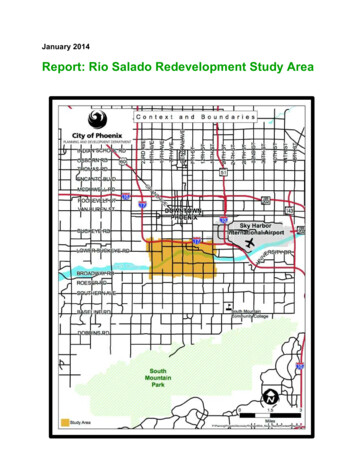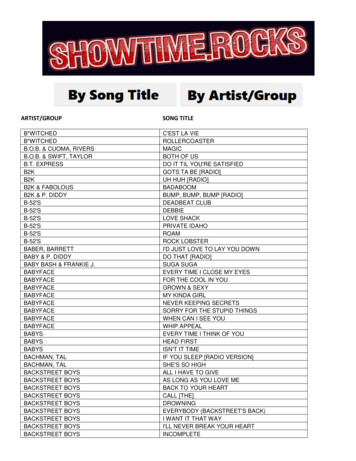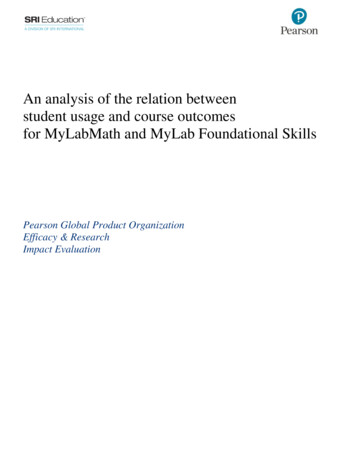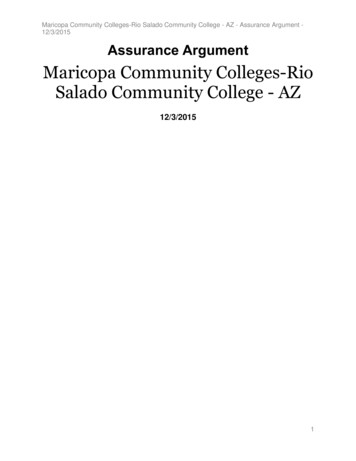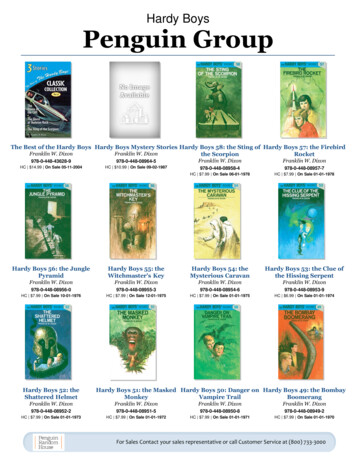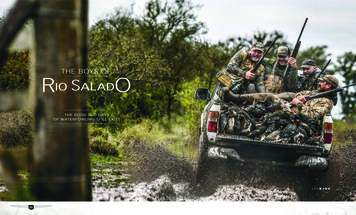
Transcription
THE BOYS OFRIO SALADOTHE GOOD OLD DAYSOF WATERFOWLING STILL EXISTLEE KJOS086
W H E E L S A F I E L DAAGE, EXPERIENCE, or maybe just eccentricity, for as long asI’ve known the Mayor and Ira, it’s never been about body countnor has it ever been about ego. These boys are slow-smoked,Southern-fried, old-guard timber, so it’s all devils and details.Process. Playing a game of precision inside an already endlessgame of waterfowling possibilities. Make no mistake, these twowould sooner not squeeze unless everything’s come togetherjust right in their mind’s eye. But when it’s perfect, they’d havea tough time not pulling up on the last duck in existence.As with any book jacket around long enough to collect the dustof time, evenings in duck camp nowadays are less about thatday’s hunt and more about bourbon-soaked memories of placeslong past. The conversations always look backward, theirs to thesouthern theatre of old Missouri and mine on Minnesota’s northern big water and the Saskatchewan prairie. No one questionsthat things have changed, and though we may not all agree onexactly why, no waterfowler who’s paying attention can denyNorth America’s bird migrations just aren’t the same. What wewouldn’t give for Doc Brown’s DeLorean and a one-way ticket!Wherever you go, the bondbetween hunters transcends cultural differences and overcomeslanguage barriers.088089
B O Y S O F R I o S A L A D OFAST-FORWARD a few months. The three of us are 6,000 milesand change from home and halfway into a questionably controlled, 10-mph sideways slide though a slurry of greasy SouthAmerican mud that a few months back had been a perfectlyserviceable gravel road. It’s the kind of frozen-in-time momentwhere a guy’s having very holy thoughts and the voice in his headrepeats a somber prayer: “If I’m gonna go today, please kill meon the return trip, Big Guy. We’ve all been waiting to see a placelike this since forever.”That place is Rio Salado, and the guy who clued me in on it isnone other than Ramsey Russell, the Dos Equis man of waterfowling. We’d met in the Mayor’s camp a few months back. I wason assignment, and as is common with old souls, there was anelectric kinship. The man just gets it. During one of our post-huntreminiscing sessions, Ramsey just flat-out blew our doors off. “Youboys really want to see what duck hunting looked like 100 yearsago? It’s out there. It’s a long ways away, and I’ll show you in July.Buenos Aires.” Clearly, Ramsey was living up to his well-deservedreputation for sussing out massively unknown waterfowl locales.Now, it’s easy to know what a few of you are thinking. Argentina?Baiting birds to keep them around? Thanks, but no thanks. AtRio Salado it’s the complete opposite, and except for a guide,the experience was more akin to a DIY hunt out of your past.Just as Russia’s Kamchatka Peninsula gives us a picture of whatAlaskan fishing looked like a century ago, Rio Salado is a duckhunt on the Louisiana coast in the 1800s or the SusquehannaFlats at the turn of the last century. Stark. Desolate. Still steepedin what used to be.Resources are few in Rio Salado, sohunters craft what they need from whatthey have on hand—like this handmadeduck call from an empty shotgun shell.090
PICTURE a 74,000-acre sprawling wetland no more than a footor two deep surrounded by all the right agriculture—wheat, corn,soybeans, and sorghum. For perspective, that’s double the size ofthe Minneapolis city limits. Here, you see 14 species of birds goabout their days as if the shotgun had never been invented. That’s092a very different Argentina and Uruguay than the ones I’d previouslyseen, with an equally different Mayor and Ira than I’d ever known.In that week, alongside our buds Fonzie and Dougie Fresh, we wereall 25 years old again. Wide-eyed, full of stoke, back to the kidswe used to know. It’s that kind of special—The Sandlot special.There are no easy rides delivering you to prebuilt blinds resting withineasy shooting distance of a bait pile. You access the marsh on foot;good waders are a must. It wouldn’t be out of the realm of possibilityto see a horse towing a hand-laid glass skiff with you, your guide, anda day’s worth of gear. Together, you formulate the plan. You chop sticksand leaves. You build your own hide and sit beside each other in shindeep water, and if the birds aren’t buying it, you move until you’re inthem. Just like hunts used to be, as sweaty and roll-up-your-sleevesgritty as Argentina gets—a wild time in a wholly wild place where anairplane and a truck ride to camp really are some sort of time machines.
W H E E L S A F I E L D094095
W H E E L S A F I E L DI felt it the moment I met Checo, Rio Salado’s veteran guide. Henoticed me appreciating the way the light bent off flank featherswhile holding my first yellow-bellied pintail. Within minutes, he’sshowing me phone pics of his family duck hunts and we’re tradingduck calls. There was a pride of place and admiration for birds inhis enthusiasm. His images read more like family history. Livingproof of what he and his dad, granddad, and siblings do whenthey’re not working. Like us, they hunt ducks because they can’tnot hunt ducks. They hold the entire act as sacred, and dudeslike this have a way of making your time at Rio Salado morelike hanging out with long-lost relatives. Despite the languagebarrier, words become an unnecessary formality. They know afellow hunter when they meet one, and their familiarity, skill,and understanding of the local waters make it more like they’rewelcoming you into their own home. In a very real sense, that’sexactly what’s happening.For those of us who also feel like we were born a hundred yearstoo late, Rio Salado confirms we’re not wrong. The numbers ofbirds stuffed into what equates to 115-square-miles will testthe computational abilities of your brain. Here, among unspoiledwetlands and lush grasses, you truly have the chance to stop andpicture the staggering bird densities North America once held. Somany birds are in this place, and they’re seemingly everywhere.Among them, the famed Rosy-Billed Pochard in stunning numbers,Black-Bellied Whistling-Duck and Fulvous Whistling-Duck, twospecies of pintail, four flavors of teal, Brazilian ducks, and more.All are relatively unpressured and playing nice the way you’d wish,call-responsive, a window back into what we once had.A word of advice to those lucky enough to find themselves ina place this magical: Indulge your idealistic side. Sift throughtime’s back catalog of your most memorable hunts and find thewide-eyed beauty and the picture of perfect that endeared you towaterfowling. Remember the way those birds worked when fullycommitted, locked up, and eating it. That’s the special sauce andalways will be, and it’s why we come to places like Rio Salado:to see birds act like birds. My crew didn’t come this far for passshots. We came for the show. Feet down, wings cupped, up closeand invading your personal space. That’s what the old days backhome were like, and unlike most South American hunts, Rio Saladois more than a shooting vacation. Here, it’s hunting again.RIO SALADO TRIPSO N LY A V A I L A B L E T H R O U G HRamsey Russell’s getducks.comMORE INFO(866) 4 3 8.3 8 9 7ramsey@getducks.com096BOSS SHOTSHELLSTHE RELATIONSHIP between you and the staff is special, too.Some folks like to rub elbows with camp owners and guests—andthere’s certainly nothing wrong with that—but the crew I roll with hasalways felt more at home around the guides. And make no mistake,they’re not Bird Boys here. They’re brothers from a different mother.BOSS SHOTSHELLS, unmuzzled manufacturers ofthe industry’s premium-plated, high-density shotshells,opened for business in mid-October 2018. Through abusiness model unlike any in the ammunition industry,the company is able to give hunters the undisputed,exceptional performance of plated bismuth and tungsten loads at a refreshingly affordable price.BOSS Shotshells are 100 percent American madeand boast weights that are far heavier than steelshot and patterns that are far tighter at distance.Combine that heavyweight punch with the industry’sfinest primers and premium powders, and BOSSbrings hunters back to the hard-hitting, clean-killdays of lead with zero risk to the environment.The company’s direct-to-consumer online salesmodel also brings hunters a true value in theammunition category. With no middleman retailmarkups and free shipping on every case ordered,BOSS customers enjoy significantly higher-performingshotgun shells at a fraction of the cost onceassociated with premium loads.BOSS Shotshells are available in 2¾- and 3-inchchamberings in 12, 16, 20, 28 gauges and .410 borewith shot sizes from 1 to 7. Additionally, 10-gaugeshotshells are 3½ inch only and cost two dollars asqueeze. Each box of copper-plated BOSS contains20 shells, priced between 23 to 31 per box, or 230 to 270 per 10-box case. All case orders shipfree. Consumers can find the full line of productsand accessories at BossShotshells.com.“Shooting copper-plated BOSS shotshells is likestepping through a time machine back to the goodol’ days of lead. Superior patterns and sinisterknockdown power mean far fewer cripples and lostbirds than with inferior steel loads. In an apples-toapples comparison, they outperformed lead whilehunting in Argentina. The guide staff—all seriousduck hunters—were overheard whispering amongthemselves about El Jefe, the magic duck cartridgefrom America.” — Ramsey Russell097
Alaskan fishing looked like a century ago, Rio Salado is a duck hunt on the Louisiana coast in the 1800s or the Susquehanna Flats at the turn of the last century. Stark. Desolate. Still steeped in what used to be. Resources are few in Rio Salado, so hunters craft what they need from what they have on hand—like this handmade
